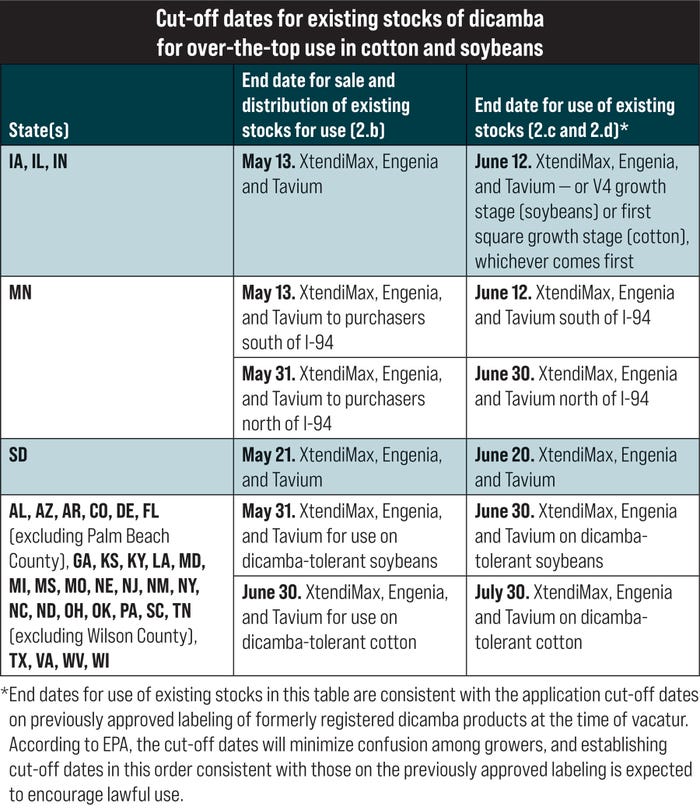
The Environmental Protection Agency’s existing stocks order issued Feb. 14, 2024 ensures farmers will still have access to the popular dicamba products XtendiMax, Engenia and Tavium this growing season for weed control in soybeans and cotton.
The move comes after over a week of waiting following the U.S. District Court of Arizona in Tucson’s decision to vacate the 2020 registrations for the dicamba products on Feb. 6.
The federal court's ruling led to confusion regarding what could be done with products already purchased and distributed to farmers, and groups called on EPA for more guidance.
What this means for farmers
The existing stocks order allows farmers to buy, accept and use XtendiMax, Engenia and Tavium dicamba herbicides currently in the U.S. that were packaged, labeled and released for shipment prior to Feb. 6. Dicamba product already in the possession of distributors, co-ops and other parties for sale before that date can still be sold and distributed, within set guidelines outlined in the order.
Bayer, Syngenta and BASF are still prohibited from selling or distributing their dicamba herbicides for over-the-top use on soybean and cotton crops.
Josh Gackle, American Soybean Association president and soybean farmer from North Dakota, says the court’s decision left tens of millions of U.S. farmland acres in limbo just weeks before spring planting. “We are very appreciative of EPA’s decision to let us get through the 2024 growing season by using any product already in the delivery pipeline,” Gackle says.
The order outlines the sale and distribution end dates for existing dicamba stocks, as well as the application cutoff dates:

Farmers who already invested in traited seeds and herbicides can breathe a sigh of relief – for now. EPA has not announced if it will appeal the federal ruling.
"With the registration for over-the-top dicamba still in limbo, producers need to be especially good stewards of these products," says Jeff Nunley, South Texas Cotton & Grain Association executive director, whose producers are on the brink of planting.
Existing stocks order details
EPA’s order addresses two main concerns following the federal court ruling last week.
First, the federal court’s vacatur of the dicamba product registrations makes the sale and distribution – including any shipping – of all the previously registered products illegal. Under the Federal Insecticide, Fungicide, and Rodenticide Act, this means it would even prohibit downstream distributors from returning the product to the manufacturer for disposal or relabeling.
The existing stocks order permits anyone in possession of the unregistered dicamba products to return them to the manufacturer.
Second, EPA’s order clarifies that farmers must follow the label requirements when they use XtendiMax, Engenia and Tavium under the existing stocks order. FIFRA does not technically prohibit the use of unregistered products – it only prohibits individuals from using registered products off-label.
EPA says this will reduce the potential environmental harm from unrestricted use, and it encourages farmers to use the previous-approved lower volatility dicamba formulations instead of turning to other dicamba products that have never been approved for over-the-top applications on cotton and soybean crops.
EPA receives praise
Herbicide manufacturers and industry groups are quickly chiming in to praise EPA on its action.
“NASDA commends EPA on issuing an existing stocks order for dicamba that is inclusive of products that are in the possession of growers or in the channels of trade,” says National Association of State Departments of Agriculture CEO Ted McKinney. “[EPA’s] action will prevent severe detrimental impacts to our food, fuel and fiber availability.”
The National Council of Farmer Cooperatives President Chuck Conner also expressed relief. “By moving quickly and allowing use of product already in the supply chain, EPA is providing some level of certainty for cotton and soybean producers across the country.” Conner says NCFC will continue to analyze the order in the coming days and discuss any specific questions with EPA.
The National Cotton Council appreciates EPA's swift action, explaining no viable alternatives would have been available to meet the needs of U.S. producers without the order. "EPA’s order will provide much-needed relief for growers already facing difficult economic conditions," NCC says.
“Farmers are committed to the safe use of all crop protection tools, and many had already made planting decisions with dicamba-tolerant crop systems in place for the season," says Zippy Duvall, president of the American Farm Bureau. "We rely on science-based guidance from EPA, and we appreciate the agency standing by farmers and science in this decision.”
About the Author(s)
You May Also Like






